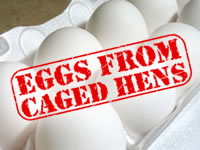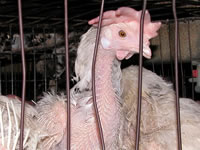- Like
- Digg
- Del
- Tumblr
- VKontakte
- Buffer
- Love This
- Odnoklassniki
- Meneame
- Blogger
- Amazon
- Yahoo Mail
- Gmail
- AOL
- Newsvine
- HackerNews
- Evernote
- MySpace
- Mail.ru
- Viadeo
- Line
- Comments
- Yummly
- SMS
- Viber
- Telegram
- Subscribe
- Skype
- Facebook Messenger
- Kakao
- LiveJournal
- Yammer
- Edgar
- Fintel
- Mix
- Instapaper
- Copy Link
Lawsuit pushes for Mandatory Truth in Labeling on Cartons, including the claim “Eggs from Caged Hens”
Walk into any grocery store in the U.S., and you’ll likely find cartons of eggs bearing a variety of advertising schemes ranging from images of happy hens roaming around outside to claims such as “animal-friendly.” Surprisingly though, what consumers see or read on the outside of an egg carton doesn’t necessarily represent how the hens who laid those eggs were treated.
Behind the vast majority of every “incredible edible” egg sold in grocery stores today is a hen so intensively confined inside a wire battery cage, she can barely even move.
 With just 67 square inches of space in which to live, she can’t even flap her wings, let alone build a nest, perch, dust bathe, or perform many other natural behaviors
With just 67 square inches of space in which to live, she can’t even flap her wings, let alone build a nest, perch, dust bathe, or perform many other natural behaviors
Numerous experts agree that battery cage confinement contributes to a number of welfare problems—and such concerns have prompted many European countries to ban this system of confinement altogether. And barren battery cages will be phased out of the entire European Union by 2012.
Battery cages continue, however, to dominate egg production in the U.S., and the egg industry has long attempted to ignore the allegations of cruelty to animals. But as a growing number of consumers discover the hard-boiled truth about modern egg production, the industry is scrambling to keep its reputation from cracking.
February 2017 Update: The U.S. Ninth Circuit Court of Appeals has denied Animal Outlook’s appeal seeking FDA mandating of accurate production-method labeling on cartons, including the full disclosure of “eggs from caged hens.” we remain undeterred in our mission to protect both hens and consumers from misleading marketing, and we will continue our efforts to ensure transparency in the egg industry.
December 2016 Update: On Dec. 14, Animal Outlook argued in the U.S. Ninth Circuit Court of Appeals in California to protect consumers and hens from widespread misleading marketing claims on egg cartons. Our appeal highlights the need for and legal merits of the FDA mandating consistent and truthful production-method labeling on cartons, including the full disclosure of “eggs from caged hens.” Stay tuned for updates in this ongoing matter.
January 2015 Update: Last month, the court disappointingly declined to order FDA, USDA, or FTC to create regulations that would correct the widespread misleading labeling of egg cartons. However, we are confident in the legal merits of the case, and recently filed a notice of appeal to the Ninth Circuit Court of Appeals—so that we can continue to fight for the interests of both animals and consumers.
Egg Labels: The Claims

Animal welfare claims on egg cartons are currently unregulated in the United States, enabling egg producers to mislead consumers with exaggerated and false claims.
More than 95 percent of eggs sold in the U.S. come from birds confined in tiny wire cages so restrictive, they can barely even move—a practice that, according to polls, most consumers find unacceptable. Furthermore, many experts agree that confining hens in these so-called “battery” cages causes tremendous suffering. Despite these expert opinions and widespread public opposition, this cruel confinement confinement continues to dominate the U.S. egg industry.
However, without any federal oversight, claims on egg cartons can—and commonly do—misrepresent to consumers how those eggs were produced. Animal Outlook has documented several cases of express and implied claims on egg cartons across the country that imply a higher level of animal care than is actually the case. Deceptive marketing on cartons of eggs produced by birds likely to have been confined in cages include the claims “animal-friendly” and “naturally-raised” as well as images of hens outside on a green pasture.
In other words, not only is the egg industry cruelly confining hens in cages, it’s also deceiving consumers about that abuse. The egg industry in the U.S. has proven incapable of regulating itself, and without government standards in place, the current egg labeling landscape is essentially meaningless.
The Lawsuit

On March 28, 2013, Animal Outlook and the Animal Legal Defense Fund (ALDF) co-filed a lawsuit against the Food and Drug Administration, two agencies within the U.S. Dept. of Agriculture (USDA) and the Federal Trade Commission for failing to regulate animal welfare labeling on egg cartons.
The lawsuit is based on rule-making petitions originally submitted by Animal Outlook (then Compassion Over Killing) to these agencies in 2006 and 2007 requesting that egg production methods be fully disclosed on all cartons sold in the U.S., including the clear identification of “eggs from caged hens.”
In spite of Congressional mandates, the agencies have failed to take any action to regulate the often-misleading claims and deceptive imagery widely found on egg cartons. Even the United Egg Producers, the U.S. egg industry’s trade association, has endorsed federal legislation containing a similar labeling program.
Mandatory labeling on egg cartons has already been implemented throughout the European Union and in several states in Australia. Consumers—and hens—in the U.S. deserve the same.

How You Can Help
Choose Egg-Free Foods: The best way each of us can help egg-laying hens is to leave their eggs out of our shopping carts. Discover delicious egg-free products and recipes.
Share this page: Tell your friends and family the truth about egg production and the misleading claims often found on cartons.
Join our efforts: Donate today to support our strategic campaigns that are making a difference for animals.

